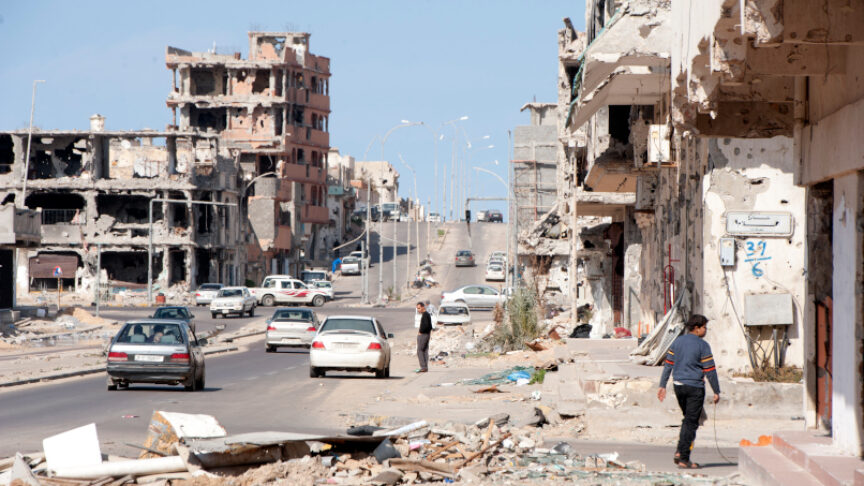Why the war in Libya is a test for Italy – and for a geopolitical European Commission
If Italy was the front facing east during the cold war, then today it is vulnerable to the south: the country has been drawn into a geopolitical competition that looms over the Strait of Sicily.
The city of Sirte is the new epicentre of Libya’s conflict. The Libyan source who recently told me this sounded relieved compared to a month ago, when rockets launched by Field Marshal Khalifa Haftar’s militias exploded in the centre of Tripoli near the Italian embassy – the only European diplomatic headquarters in Libya that remained open during the hardest months of the war.
Today, Haftar – the head of the Libyan National Army, who is backed by Russia, Egypt, and the United Arab Emirates – appears rather bruised. He has been unable to conquer the capital: thanks to Turkey’s military backing, President Fayez al-Sarraj’s fragile government there held out. Accordingly, Ankara and Moscow face an “existential” choice in Libya: apply maximum pressure on Sirte or try to come to terms with each other instead. However, an agreement between the sides would entail a further division of Libya into spheres of influence – as if the country was not divided enough already.
Will the conflict continue, or will it freeze over? The general feeling is that both the interests at stake and the weight of the parties involved make a real showdown between Russia and Turkey very unlikely.
President Recep Tayyip Erdogan’s Turkey should feel satisfied so far. By using of one of the classic instruments of foreign policy – the military, which both Italy and the European Union are reluctant to deploy – Turkey has reached a bilateral agreement with Tripoli that balances the accounts of history (the Ottoman expulsion from Libya in 1911) and gives it a competitive advantage in the exploitation of energy resources in the eastern Mediterranean. For Turkey, the Libyan conflict is also part of the broader ideological clash within the Sunni world (between supporters and opponents of the Muslim Brotherhood).
President Vladimir Putin’s Russia, meanwhile, has an opportunistic policy: it supports Haftar only lukewarmly, favouring representatives of the old regime such as Muammar Qaddafi’s son, Saif; it deploys mercenaries wherever it wishes, exploiting the voids created by American disengagement and European marginalisation. Moscow’s involvement in Libya’s oil crescent remains limited, with no more than 1,200 Russian mercenaries and a few old MiGs deployed there. Russia’s strategic interests are in Syria, while its interests in Libya are narrower and mostly of an economic nature (such as in reactivating infrastructure projects there that it signed before the 2011 revolution).
Italy can still catch up: its decision to assist Tripoli in demining areas abandoned by pro-Haftar militias is a first step towards a more reliable position.
Putin is also exploiting the crisis to consolidate relations with Egypt (which neighbours Libya and has significant influence in Cyrenaica) and to establish Russia as a Mediterranean power. The presence of Russian-built aircraft at Al Jufra base, in central Libya, symbolises this effort. It is unclear, however, whether Moscow possesses the necessary economic strength to gain an active military role in the Mediterranean. Moreover, a direct Russian military intervention in Libya would capture the attention of the United States. So far, Libya has been a peripheral issue for the White House. However, a Russian military presence just a few hundred kilometres away from US bases in Sicily would change the strategic equation entirely. After hoping that the Europeans would take care of Libya, and after supporting Haftar in the hope of his victory, President Donald Trump has finally re-established a dialogue on Libya with Erdogan: better to bet on a NATO country than to give Russia too much space.
All these dynamics have a direct effect on Italy. If Italy was the front facing east during the cold war, then today it is vulnerable to the south: the country has been drawn into a geopolitical competition that looms over the Strait of Sicily. And Turkey is now in a position to manage migration flows to Europe not only from Anatolia but also from North Africa.
In the spheres of influence scenario, Tripoli has an interest in balancing Ankara’s influence with that of other outside powers, to avoid geopolitical suffocation. And this could create an opportunity for Italy. Rome initially supported the Sarraj government, but quickly abandoned it once Haftar’s offensive began: in essence, it oscillated between the conflicting parties, creating the impression that it was an unreliable partner.
Yet Italy can still catch up: its decision to assist Tripoli in demining areas abandoned by pro-Haftar militias is a first step towards a more reliable position. A diplomatic initiative could follow: the weakening of Haftar changes France’s strategic calculations and allows for the convergence of EU member states’ positions on Libya during the German presidency of the EU. Libya is an inevitable test for what President Ursula von der Leyen has called a “geopolitical” European Commission. So far, however, the Commission has been anything but.
The strange war in Libya is a wake-up call. Europe will either deal with the instability on its borders or soon discover that it can no longer defend them.
Marta Dassù is an ECFR Board and Council Member and Senior Director of European Affairs at The Aspen Institute.
The European Council on Foreign Relations does not take collective positions. ECFR publications only represent the views of their individual authors.



